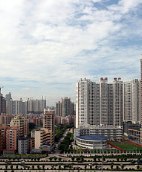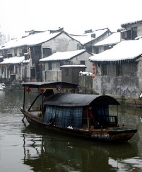In February I went home to visit my parents in Shandong, eastern China. It was the Chinese New Year holiday and the country was hit by the worst snow for half a century, which left tens of thousands of people stranded at train stations and airports in southern China. Fortunately, although there was some snow in Shandong, transport was not affected and I made it home in time for New Year.
As my mother fried me some traditional New Year’s cake, we chatted about the blizzards that had paralysed half the country. It was strange that the south had borne the brunt of the bad weather, she remarked, since it’s the part of the country least likely to see snow. “It must be that climate change they talk about,” she said. “The weather might get stranger, not just warmer.”
It is more customary for my mother to ask me about my wife and son and to discuss my work and my health; this was the first time she had ever mentioned climate change to me. Until then, I saw climate change as topic of conversation for scientists and environmentalists, far removed from the life of a 76-year-old woman from a small village. So, why did it interest her?
It made me think of a BBC World Service global poll from September 2007. The study, which surveyed around 1,000 people in a range of countries (and about 1,800 people in China), found that Chinese people were unusually aware of climate change, with 87% believing “human activity, including industry and transportation, is a significant cause of climate change.” This percentage was 71% in the US, 78% in the UK and 47% in India. In China, 70% of respondents thought “major steps starting very soon” should be taken to reduce the impact of human activity on the climate; as opposed to 59% in the US, 70% in the UK and 37% in India.
Readers were shocked by the results of the poll. Professor Martin Bunzl, director of the Rutgers Initiative on Climate Change and Social Policy, emailed me to ask if the Chinese respondents might have confused climate change with pollution. On checking the Chinese version of the questionnaire, I saw there was no room to make this mistake. However, the particular response in China may reflect the relatively high levels of education in Shanghai and Beijing, where the survey was carried out. In some other countries, including the UK, the US and India, the sample comprised both rural and urban residents.
The survey, therefore, probably does not mean there are such high levels of awareness across the Chinese population as a whole. Urban China and rural China are poles apart and the majority of rural residents are still unaware of climate change.
But what about my mother? She spent the first 50 years of her life in a village and moved to a small county town 20 years ago. She is not as well-educated as most city dwellers, though she is an elementary school teacher, enjoys watching the news on television and has an understanding of science.
“You’ve heard of climate change?” I said.
“Heard of it? I’m seeing it,” she replied. “It’s much warmer than it used to be. The ground used to freeze around the period of ‘light snow’ [in late November], and the river used to freeze during the ‘heavy snow’ [in early December]. Now, it’s still warm in late November and the river doesn’t freeze when it used to either. We used to wear padded-cotton jackets, trousers, shoes and hats in winter. Who wears padded-cotton shoes now? You don’t even need a hat.”
“When did you start to notice?” I asked.
“The year that Yao He was married, I think. I don’t recall the actual year. But his son is grown up and married now.” Yao He comes from our same village; my brother was at his wedding celebrations. I laughed because that would mean the warming started three decades ago. My mother said the wedding was in December or January, but it was so warm that nobody kept their jackets on. “When you were little, it got as cold as -18 degrees [Celsius], now the coldest it gets is -10. That’s a huge difference.”
My mother first heard about global warming from the television news at some point in the past few years. She doesn’t rely on the news, however, to tell her why it’s happening: she has her own opinions. “There are too many people, too many cars and too many factories. And there are fewer trees and less water.”
In the past, she said, there were more forests, with cool air under the trees. There was a pine forest near my grandmother’s village and you could hear the rustling of the trees and the cooler air as you approached. “It was cut down ages ago,” she said. “It’s all houses there now. Trees absorb carbon dioxide and release oxygen. Without forests, the temperature’s going to go up.”
My mother also blames the increased numbers of factories for the warming. “Get out of a car in summer and it’s like stepping into a furnace. Why? All that hot air has been blown out of the car. Just like factories: all those factories burning coal must be releasing hot air and carbon dioxide.”
The country’s largest paper-making group is based in the outskirts of our small town, along with a large fertiliser factory, two breweries and a great number of smaller factories. Taxes from these industries help to rank our county government as the thirtieth richest county of 2,000 counties in China.
I then asked: “Are climate change and pollution the same thing?”
“Yes,” my mother replied. Factories produce heat and emissions when they burn coal, she said. “When I was young there wasn’t any pollution. The sun was scorching hot when it shone through the clouds: we used to say it was as cruel as a stepmother. Where do you see a blue sky – or even the sun – nowadays? Step outside around here and it’s nothing but grey, like the clouds have fallen down. Even the sun appears hazy!”
The lack of water in the rivers is also worsening climate change, my mother believes. Thirty years ago, the river in our village was wide and deep, but it suddenly dried up, exacerbating the loss of groundwater. Before 1976, there was water two metres below ground level and my mother could lower her bucket down the well on its pole. But that year we dug our own well, and we had to dig five metres before hitting water. Two years later, it was nine metres. By 1980 it was 20 metres; now even 30-metre-deep wells are dry. Our village was named for its two wells; the stone edges of the wells had deep grooves that were rubbed by the ropes used to haul buckets for six centuries. In only 10 years, environmental degradation killed off a 600-year-old tradition.
The cause was the large number of salt, soda and chemical plants built kilometres away. Two pumping stations were built near our village, which sent water to the factories through metre-thick pipes. Soon, the county’s four rivers had all dried up. It was the first time the county, with a population of one million and records dating back over two millennia, was left without a single flowing river.
The rivers are dry; the forests are gone and replaced by factories and chimneys that belch smoke into the air and waste into the ground. And all for the sake of China’s GDP growth. My mother has seen it happen. Perhaps professor Bunzl is right: Chinese people do tend to confuse climate change and pollution. But for an ordinary Chinese person like my mother, the two are very closely related. Her perspective is not the same as that of scientific reports; she is responding to the decades of changes she has seen throughout her lifetime.
My mother, like the scientists and environmentalists, is aware of the threat climate change poses and supports efforts to reduce it. “We can’t close the factories. How will people put bread on the table?” she said. “But we should do something about them. We should change the black smoke to white.”
Liu Jianqiang is a reporter from Beijing, currently a visiting scholar at University of California, Berkeley.
Homepage photo by Haldini




